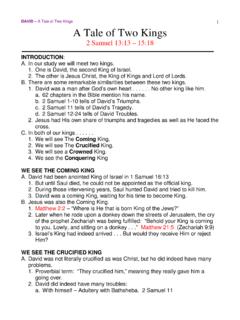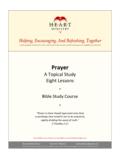Transcription of Second Sunday in Advent Malachi 3:1-4, The Song of ...
1 Second Sunday in Advent Malachi 3:1-4, The Song of Zechariah, Luke 3:1-6. December 6, 2015. David Teschner In the seventh year of Barack Obama's presidency, when Terry McAuliffe was Governor of Virginia, and Mitch McConnell was the Senate Majority Leader, and Paul Ryan was Speaker of the House, during the high priesthood of Francis and Michael, the word of the Lord came to _____ in the _____. If Luke were writing his gospel today, assuming he was an American Catholic or Episcopalian, it may have sounded something like I just read with a name and place included. Luke's intention here is two-fold. In the first place he wants to place John the Baptist and, more so, Jesus of Nazareth, in real, historically accurate time. John and Jesus are not fictional or mythical characters, but red-blooded individuals who appeared on earth and spoke and performed by divine inspiration at the precise time as these other notable men. Tiberius, Pontius Pilate, Herod, Philip, Lysanias, Annas and Caiaphas were household names in first-century Palestine.
2 They were the newsmakers, lawmakers, peacekeepers, war wagers and policy makers. They called the shots, and few challenged their power and authority. As powerful as these men were 2,000 years ago, Luke makes it clear that the word of God did not come to any of them or through any of them. No, the word of God came to John, son of Zechariah, in the wilderness. The contrast here is meant to be startling. Compare the Emperor Tiberius from Rome with the Roman Legions at his command to John from the Judean wilderness. John stands alone and his finest dress is rough animal furs. Compare Annas and Caiaphas, high priests of the Temple in Jerusalem, Second only to God in the Jewish religious hierarchy, to John, son of a low-level priest, with no credentials, no appointment, no pedigree and no domestication. This no-body John appears out of no-where not unlike a prehistoric man who just thawed out of an ice pack. To say he was rough around the edges is an understatement. Nonetheless, this wild, untamed, exposed nerve, as someone referred to him, is the Most High God's first choice to deliver the word about a greater one who is coming.
3 Luke's Second reason, then, for naming the high and mighty of John's day is to say that God doesn't always, perhaps even rarely, speaks through those who occupy lofty and prominent places in society. Thinking back in Jewish history, we remember David was the youngest of Jesse's sons when he was chosen to be King of Israel. Moses couldn't speak all that well and had killed an Egyptian. Joseph was a braggart and thus sold into slavery by his brothers. Their father, Jacob, tricked his older brother out of his blessing. Isaiah was a man of unclean lips. Matthew was a tax collector. Peter denied knowing his Lord, and Paul was a persecutor of the church before his conversion. God has and continues to call flawed and imperfect people to live and spread his word. You and I are proof of that. This isn't to say that God can't use the rich and powerful and notably religious to do God's will as well. Pope Francis is speaking a very Biblically prophetic and challenging word everywhere he travels in the world.
4 Mark Zuckerberg, founder of Facebook, and his wife, have just pledged 99. percent of their Facebook stock or 45 billion dollars for charitable purposes. On the Second and third Sundays of Advent , we always hear from this formerly obscure figure named John the Baptist. You just can't get to Christmas without first going through rough and tumble JB and his strong message of repentance. Alone in the wilderness for many years, he could listen for a voice that wasn't his own or that of others. He heard the voice of the Wholly Other.. Luke equates him to one crying in the wilderness: Prepare a super highway for our God that is straight and smooth with all the valleys filled and the mountains leveled off. This imagery comes from the Prophet Isaiah when 500 years earlier God was urging the Jewish people to return on this red carpet from exile in faraway Babylon back to Jerusalem. Used here in reference to John's message, the highway that needs straightening, leveling and smoothing is our individual thinking and behaving.
5 John says for us to straighten out our wayward behaviors, smooth out our rough and bumpy dispositions and return to level headedness, if we want to be ready for the Lord when he comes. And we know that the Lord wants to come to us and be part of every moment of our existence. Repentance should be a regular exercise and discipline of acknowledging that we make occasional mistakes by losing our cool, considering only our own interests or making snap judgments about people or situations. In the process, we advertently or inadvertently cause hurt and pain and unravel the human fabric. Another way of saying this is that we all have demons of one sort or another. The larger sin is not to acknowledge them at all. The work of repentance is to pray to have God take away their power over us. We are all needed to accomplish the work which Jesus began that all flesh would see the salvation of God. Someone once said, the world is moved along by the mighty shoves of it heroes, but also by the aggregate of the tiny pushes of each honest worker.
6 We don't have to do newsworthy things to accomplish important and life-enhancing changes. Tom Brokaw is credited with saying something to the effect of, Anyone can make a buck, but making a difference is what really matters.. While our politicians argue over how best to defeat terrorists militarily, we contribute to the defeat of any and every kind of evil by continuing to practice personal repentance with the evil within so outward Christian kindness and generosity can prevail every day and everywhere. We make a difference regularly by caring for and showing respect for ourselves and everyone we meet even if they don't offer the same in return. Our combined seemingly tiny pushes result in a formidable aggregate of good will and peace on the earth. I get the monthly newsletter from Covenant Presbyterian Church. At the end of an excellent message about Advent from the pastor, Sarah Nave, in the December edition, she closed with these words, Watching and waiting (and under construction) with you this Holy Season.
7 I hope, we too, will consider ourselves most fortunate to be useful to our Lord even while we are under construction for even greater usefulness at this time, 2015, and in this place, Southern Virginia. AMEN.







